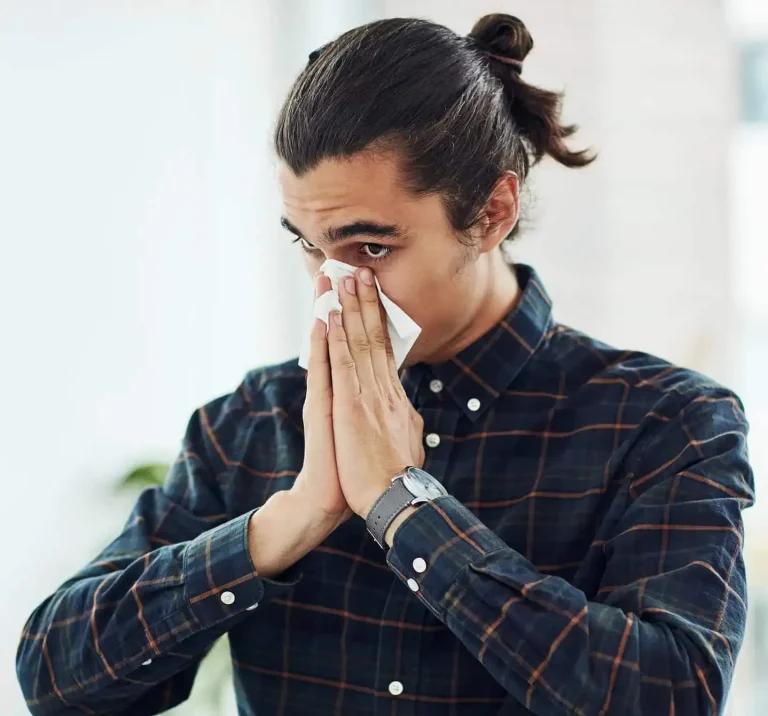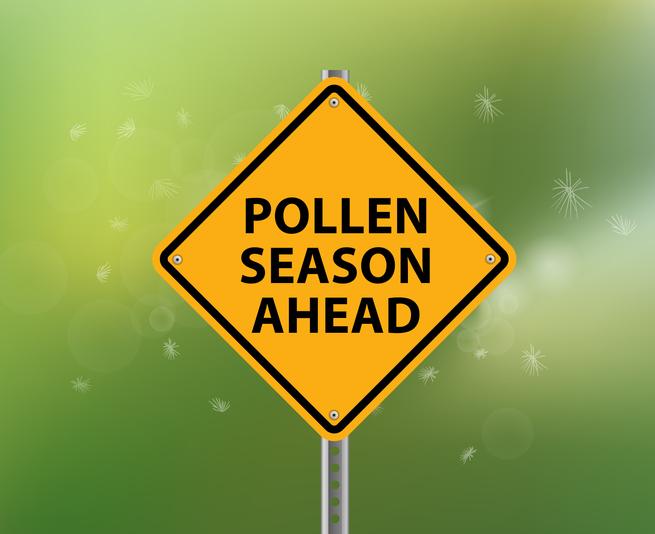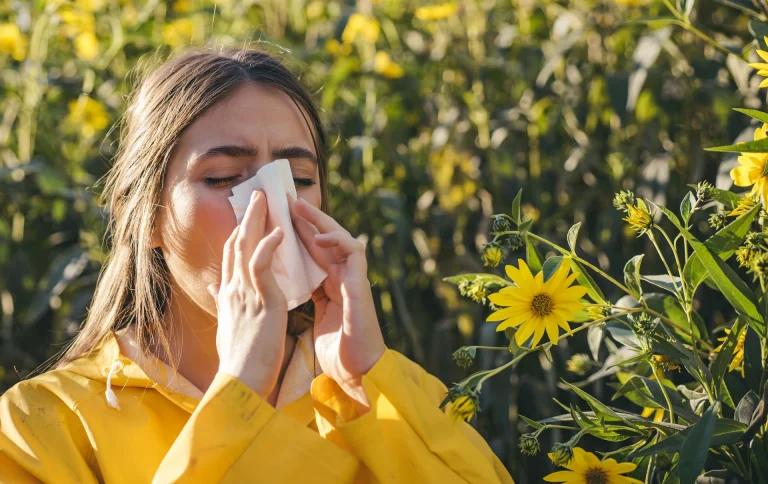
Some people may be surprised that hay fever is an allergic reaction to particular types of pollen. For those who suffer from this condition, the symptoms can be quite debilitating and interfere with daily life, particularly during summer and spring. There’s no cure for hay fever. Fortunately, treatments available can help lessen the impact of hay fever. In this blog post, we will explore some treatment options available for those suffering from hay fever. Stay tuned for more information!
What is hay fever?
Hay fever, also known as allergic rhinitis, is a condition that affects millions of people around the world. It occurs when the body overreacts to histamine, a substance released in response to allergens such as tree pollen, grass pollen or weed pollen. Hay fever typically begins in late March or early April, when tree pollen counts are at their highest. Grass pollen levels peak in May and June, while weed pollen counts remain high throughout summer.
Symptoms of hay fever include sneezing, runny nose, itchy eyes and fatigue. These symptoms may become more severe when there is a high pollen count. While there is no cure for hay fever, there are many ways to manage the symptoms and enjoy a healthy spring and summer. For many people, hay fever is a minor annoyance. However, it can be a debilitating condition for others that seriously impacts their quality of life.
If you have hay fever, you’re more likely to have other conditions in the same group, including eczema and asthma. If you have asthma, uncontrolled hay fever will often worsen asthma symptoms.
The link between hay fever and asthma
Hay fever and asthma are two conditions often spoken about in the same breath. It’s no surprise that hay fever symptoms (such as a runny nose, sore eyes and sneezing) can be very similar to asthma symptoms (wheezing, shortness of breath and a tight chest). Hay fever is often a trigger for asthma attacks. According to the NHS, around 80% of people with asthma also have hay fever.
For those who also have asthma, hay fever can be a severe health concern. Hay fever and asthma symptoms often overlap, making it difficult to distinguish between them. In addition, hayfever can trigger asthma attacks, leading to increased symptoms and a need for healthcare intervention.
Immunotherapy may be recommended for severe cases of hay fever, as this treatment can help to reduce allergy symptoms. However, hayfever sufferers should talk to their healthcare provider before starting any new treatment, as some treatments may not be suitable for those with asthma. The best way to manage both conditions is to work with your healthcare team who can create a tailored treatment plan. With the right care, it is possible to control both hay fever and asthma symptoms.
Symptoms of hay fever
- Blocked nose
- Sneezing
- Sore throat
- Watery eyes
- Sinus pressure
These are just some of the symptoms that can make enjoying the outdoors nearly impossible but there are treatments available from your pharmacist and GP that can help alleviate hayfever symptoms.
Treatments from your pharmacist
Several over-the-counter hayfever treatments can help to lessen the symptoms.
Antihistamines
Antihistamines can help to reduce overall inflammation. They work by blocking the chemical histamine, which your body releases when it thinks you’re under attack from an allergen. This stops allergic reactions and clears up symptoms like itching or sneezing, but may not help with a blocked nose.
Antihistamines can be used in two ways: taken when hay fever symptoms appear or when you know the pollen count will be high to prevent symptoms. Cetirizine and loratadine are commonly used antihistamines that shouldn’t cause drowsiness. They are available to buy in pharmacies as tablets or liquid. Some nasal sprays are only available on prescription.
Decongestants
Decongestant nasal sprays are useful to use if nasal congestion and a blocked nose are particularly bothersome. It targets the inflammation and swelling of the nasal passages but this is a short-term treatment option of 7 days. Prolonged use can cause irritation and rebound congestion.
Eye drops
If eye symptoms are persistent and have not cleared up using a decongestant or steroid nasal spray then eye drops are available. Cromoglicate eye drops are widely used and available from your pharmacy without a prescription. Contact lenses shouldn’t be worn when using these eye drops.
Your pharmacist can help you to choose the best treatment for your individual needs and provide guidance on how to use them effectively. Whatever treatment plan is pursued, the goal should be to find the one that provides the most relief with the least amount of side effects.
Treatments from your GP
If over-the-counter hay fever treatments are not providing relief, it is important to consult with a doctor. There are prescription medications that can be more effective in treating hay fever symptoms.
Steroid nasal sprays and drops
Steroids, also known as corticosteroids are available as a nasal spray or nose drops. A common medication that helps to reduce inflammation and congestion in the nasal passages, making it easier to breathe.
Your GP may use corticosteroids if your hayfever has failed to clear up with antihistamines and:
- A blocked nose is persistent
- You are pregnant or breastfeeding
Steroid nasal sprays and drops are more powerful than over-the-counter medications. They need to be used regularly and ideally before symptoms begin.
Immunotherapy
Your GP may refer you for immunotherapy, if all other treatment options for hayfever have failed. It is typically used for people with severe allergies who do not respond well to other treatments, such as avoidance and medication. This treatment option can only be carried out by a specialist and in the UK it is namely used for people with severe allergic rhinitis and sensitivity to bee and wasp stings.
When someone has hay fever, their immune system starts to produce an excess of antibodies called immunoglobulin E (IgE) when exposed to a sensitive allergen. This can then release other substances such as histamine into the bloodstream that cause hayfever symptoms. Immunotherapy seeks to alter the immune system so that it no longer overreacts to a substance that is not actually harmful, such as pollen or pet dander.
This treatment for allergies involves exposing a person to small amounts of the substance they are allergic to, to desensitise their immune system. Immunotherapy can be given as injections, tablets or drops placed under the tongue (sublingual immunotherapy).
The first step in treatment is usually a skin prick test, which helps to determine whether immunotherapy is likely to be effective. Sometimes a blood test for allergic antibodies is also needed. If the test is positive, then immunotherapy can be started. Additionally, you will need to be assessed for your general fitness, you will need a discussion around your medical history and current medication. Some high blood pressure medications can interact with immunotherapy.
Once the specialist confirms you are a good candidate for immunotherapy you will join a waiting list. Pollen immunotherapy cannot be started during pollen season. Improvement with this type of medication doesn’t usually happen immediately; it can take up to 6 months before symptoms improve, often longer than expected. It’s best if you keep on taking your regular hayfever medications while undergoing treatment. Treatment typically continues for 3-5 years so the effects of the immunotherapy are well-established.
Your immune system will gradually become less sensitive to the allergen over time, and the symptoms of an allergic reaction will lessen. Immunotherapy is not a cure for allergies, but it can help to lessen the severity of symptoms and make them more manageable.
Lifestyle changes
Your lifestyle can aggravate hayfever symptoms. Surprisingly some of the following lifestyle tips alongside medication could ease your symptoms and improve your quality of life:
- Reduce the amount of alcohol you consume – some alcoholic beverages contain histamine
- Take regular exercise – on very high pollen count days a gym indoors or swimming maybe better
- Eat a balanced and varied diet – including omega-3 and 6-rich foods such as oily fish, nuts and seeds as they have anti-inflammatory qualities
- Reduce your stress levels – hay fever in its severe form can be intense and crippling
- Better sleep – you are in a better position to manage symptoms when you are well rested
Home remedies
While there are many traditional treatments available, such as antihistamines and corticosteroids as mentioned earlier, some people prefer to explore herbal or alternative remedies. Here are a few that may provide relief:
- Steam inhalation. This is a popular remedy. Taking a steamy shower or inhaling steam from a bowl of hot water can help to loosen congestion, soothe irritated sinuses and open up the airways. Add a few drops of eucalyptus oil or lavender oil to the water for an extra boost
- Honey. Some studies have shown that honey can be effective in treating seasonal allergies. It’s thought that honey can help to build up immunity to pollen over time
- Cold compress. This is a simple remedy. Applying a cold compress to the sinuses can help to reduce swelling and inflammation
- Herbal teas. Herbal teas made with chamomile or ginger may help to relieve hayfever symptoms
- Garlic and onion. Eating garlic or onion may help to reduce histamine levels in the body and ease symptoms like sneezing and runny noses
- For those who are looking for more long-term relief, acupuncture has been shown to be helpful in some cases
While there is no one-size-fits-all solution for hay fever, these remedies can offer some relief from the misery of constant sneezing and sniffling.
Other ways to improve hayfever symptoms
At certain times of the year you can reduce exposure to pollen by doing some of the following things:
- During hay fever season keep up to date with the pollen forecast
- Before heading outdoors apply Vaseline around your nostrils to catch pollen before it gets into your nose and airways
- When outdoors wear wraparound sunglasses
- Avoid cutting or walking on or near the grass
- Limit your time spent outdoors, particularly on windy days – pollen spreads quicker with the wind. Air conditioning can be helpful
- Avoid bringing fresh flowers into the house
- Keep away from smoky environments – this can aggravate symptoms
- Dry your clothes indoors to avoid them catching pollen
- Keep animals outdoors if possible as they can bring pollen indoors
Hay fever can be a real annoyance, but there are many ways to treat it. Speak to your healthcare professional about the best way to manage your hay fever symptoms. There are many over-the-counter and prescription medications that can help, as well as some natural remedies you may want to try. No one has to suffer from hay fever – there are plenty of ways to get relief.
Sources
NowPatient has taken all reasonable steps to ensure that all material is factually accurate, complete, and current. However, the knowledge and experience of a qualified healthcare professional should always be sought after instead of using the information on this page. Before taking any drug, you should always speak to your doctor or another qualified healthcare provider.
The information provided here about medications is subject to change and is not meant to include all uses, precautions, warnings, directions, drug interactions, allergic reactions, or negative effects. The absence of warnings or other information for a particular medication does not imply that the medication or medication combination is appropriate for all patients or for all possible purposes.









